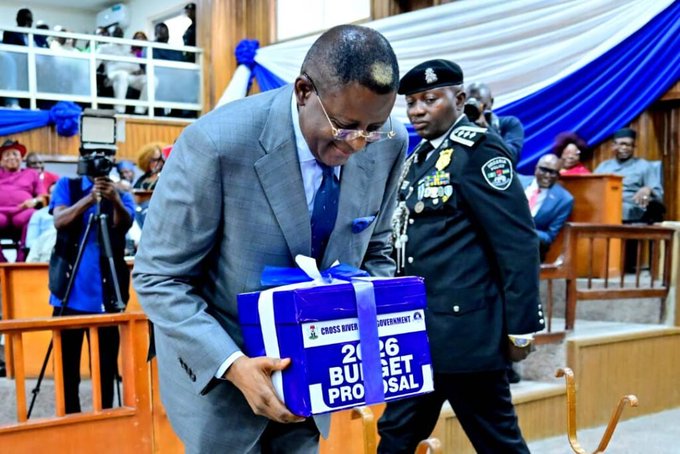Governor Bassey Otu of Cross River State has presented a ₦780.59 billion appropriation bill for the 2026 fiscal year to the state House of Assembly, labeling it the “Budget of Inclusive Growth.”
Otu stated that the proposal is designed to solidify the achievements of his administration’s “people first” agenda, emphasising that the annual budget serves as a crucial “social contract” with the citizens.
He noted that the 2026 plan was formulated after extensive consultations with citizens, non-governmental organizations, private sector groups, and civil society organizations.
READ ALSO: APC names Bassey Otu head of 2025 Anambra campaign council
The governor announced a significant shift in his administration’s performance metric, moving away from measuring success solely by Gross Domestic Product (GDP) to focusing on the Human Development Index (HDI).
This signals a greater commitment to improving vital sectors such as healthcare, education, and access to electricity, particularly in rural areas.
To address social welfare, Otu disclosed plans to activate the Cross River Social Investment Programme (CRSIP).
This multi-sectoral, non-political initiative aims to empower vulnerable populations, including women, youth, and the elderly.
The proposed ₦780.59 billion budget represents a 17% increase over the 2025 budget.
The breakdown shows a strong focus on development, with capital expenditure amounting to ₦519.6 billion, representing 67% of the total budget.
Recurrent expenditure stood at ₦260.96 billion, accounting for the remaining 33%.
In the sectoral distribution, ₦421 billion was allocated to the economic sector, ₦163 billion to social services, ₦164 billion to general administration, ₦28 billion to law and justice, and ₦3.6 billion to regional development.
Otu highlighted that the preceding year’s “Budget of Sustainable Growth” was revised upward from ₦538 billion to ₦642$ billion due to improved revenue collection and careful resource management.
This revenue growth financed critical initiatives, including maternal and child health programs, road maintenance, and rural electrification.
The governor cited the state’s success in healthcare, noting that the state achieved the number one ranking nationwide in routine immunization coverage at 95%—a direct outcome of the “people first” policy.
Infrastructure progress was also noted, including the near completion of the Obudu Passenger and Cargo Airport and ongoing negotiations for the Bakassi Deep Seaport.
Completed and ongoing road projects mentioned include the Adiabo–Ikoneto Road, the Esuk Utan–Depot dual carriageway, and the Yahe–Ebo–Wanakom–Wanikade Road.
Furthermore, he noted the installation of solar streetlights and rural mini-grids, the renovation of hospitals across the state, and the nearly finished Ikom General Hospital, adding that all state schools of nursing have received full accreditation.
On institutional reforms, Otu confirmed the full implementation of the national minimum wage and the partial settlement of retirees’ gratuities.
READ ALSO: Tinubu honoured as Akwa Ibom’s Otuekong, calls for national unity
Efforts to improve service delivery include the extension of fiber optic connectivity across Ministries, Departments, and Agencies (MDAs), and the digitization of the state’s land administration system, which has enabled the resumption of issuing Certificates of Occupancy (C of O).
Otu stated that the 2026 budget is designed to “strengthen our revenue base, drive human capital development, and build a prosperous, peaceful, and resilient Cross River State.”



